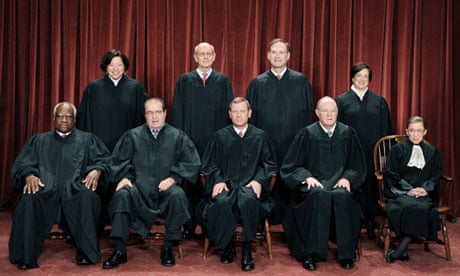When will there be enough women on the United States supreme court?
Supreme court Justice Ruth Bader Ginsburg says when all nine seats are filled by female judges:
"So now the perception is, yes, women are here to stay. And when I'm sometimes asked when will there be enough [women on the supreme court]? And I say when there are nine, people are shocked. But there'd been nine men, and nobody's ever raised a question about that."
Ginsburg's comments, which were made last month, ruffled some feathers – but she's right. As she herself pointed out, for most of the supreme court's history, all of the justices were men and no one "ever raised a question" about that. The court isn't like Congress or a corporation where there are hundreds of people serving and female-only representation would suggest a serious (and probably intentional) imbalance. There are only nine justices on the supreme court. It's not unreasonable to think that, at some point, nine of the finest legal minds in the country would belong to women.
Unfortunately, an all-female supreme court is a long ways off. And not because women aren't just as smart as men, don't achieve as highly or aren't as ambitious. But because, socially, we set men up to succeed and set women up to fail.
Law school graduation rates between men and women are roughly equal, and that's been the case for two decades now. The number of female first-year associates at law firms is roughly equal to the number of male associates. But as attorneys' careers progress, the number of female lawyers become fewer.
Women account for just under 20% of law firm partners, and only 15% of equity partners. They serve on fewer influential committees, and account for 19% of general counsel positions at Fortune 500 companies. Women of color fare even worse – they're only 2% of law firm partners.
As a former attorney at a law firm, I saw how this works firsthand. I sat in on what felt like hundreds of panels and discussion groups on "work-life balance" (not to mention reading the hundreds of news articles on "having it all" concluding that women can't). And in all of those meetings – and in all of those articles – the only people discussing and being discussed were women.
Even online, the conversations are largely in women's spaces: talking about what women can or should do differently, or what institutional changes need to be made so that women can work – according to the Mitt Romney model – with enough flexibility to go home early to cook dinner for their husbands and children. The answer seemed to always be, "Well, no one can have it all" and "we all make the choices that work best for us."
But that's not true. If "having it all" means having a successful and fulfilling career while being an involved parent, plenty of men actually do have it all. So do many women. And while we might make the choices that work best for us, the universe in which we make those choices is awfully accommodating to men, and forces women to make the harder (and often more financially ruinous) decisions.
Consider, for example, the fact that only 44% of married male lawyers have a spouse who is employed full-time. That means that more than half of male lawyers have a person at home who can dedicate significant amounts of time to taking care of every aspect of the couples' out-of-work life: housekeeping, childcare, home finances, vacation-planning, social calendaring. Female lawyers, by contrast, are overwhelmingly married to partners who have full-time jobs.
It's a whole lot easier to be the kind of employee who works 16-hour days and dedicates your life to your job when that's the only thing you actually have to worry about – because you have a spouse who takes care of all the rest.
Even in marriages where both partners work, men do significantly less childcare and housework. Married women with children do almost an hour of housework every day. Married men with children? Fourteen minutes.
And while men today spend more time with their children than ever before, married women who work full-time and have children spend almost twice as much time with those children as married working men do. Married employed mothers are also more likely to spend time with their kids at all – 72% of them say they care for their children on an average day, compared to just half of married working fathers.
It's not just the number of hours put in at home; it's the fact that men are advantaged simply by virtue of existing as men. Men are seen as more likeable, more competent and more hireable, so they're paid more, treated better by their peers, are more likely to be mentored and generally handed a slew of unseen (and unearned) advantages.
Consider the likeability gap, which Facebook CEO Sheryl Sandberg emphasized in her Ted talk and has been discussing ever since: the fact that as men get more successful, they're more well-liked, and as women are more successful, they're liked less. It's a problem on two levels. Hard-working women are perceived as bitchy and difficult to work with, which stands in the way of promotions and professional success. Second, women – who are socially groomed to be accommodating and nice – undermine their own success by putting likeability ahead of ambition. As Jessica Valenti highlights in the Nation this week:
"[T]he implications of likeability are long-lasting and serious – women adjust their behavior to be likeable and as a result have less power in the world."
Women are also simply perceived as less competent. In a recent study, researchers submitted student applications for laboratory manager positions. Their findings revealed that:
"Faculty participants rated the male applicant as significantly more competent and hireable than the (identical) female applicant. These participants also selected a higher starting salary and offered more career mentoring to the male applicant."
So, simply by virtue of being a man, you're seen as more hireable, more intelligent and more effective at your job.
And then, there's mentorship. The small number of female law firm partners are already stretched thin. At least in my experience, they tended to sit on more firm committees (if not the most powerful ones) than the average male partner; they were in the "women's groups"; and they worked the same long hours as the male partners. They were the ones who always seemed to be in charge of things like ordering the food for client and department meetings. They often had kids, and were pulled by all the life stuff that comes with having kids and no stay-at-home or part-time employed spouse, in contrast to many of the male partners.
The small number of female partners were also on the hook for mentoring the female half of the first- and second-year associate class. So, while there were tons of male partners around to mentor the young male lawyers, there were just a few female partners to mentor the same number of young women. The result, of course, is that younger female associates aren't mentored as much or as effectively as men. And female partners, again, feel as though they're failing or not doing enough.
Of course, male partners can be mentors of young women, too, and there are some who go out of their way to do so – but not very many. More often, they mentor the people who they just "happen" to have more in common with: young white men who are already perceived as being more competent than their female peers. I've watched my male law school peers get invited to exclusive social clubs by their male partner mentors, be explicitly groomed for partnership, go on important client dinners and play squash with the most senior men in the firm, while young women saw few of those advantages and ended up leaving for other jobs, or no job at all.
All of this creates a perfect storm for women to leave (or be pushed out of) high-paying legal jobs, while men are fast-tracked to success. And the media narrative reduces it to women's inability to "have it all", or women "choosing" to opt out. It's not much of a choice, though, when one half of the population is repeatedly given a leg up, while the other half is slapped down, at every turn.
Justice Ginsburg is right: there will be enough women on the supreme court when we see it filled by nine female justices. But that won't happen until women have real access to power and when, crucially, men start to change by actually pulling their own weight, not relying on stay-at-home wives, being aware of just how deep unconscious gender bias goes, making efforts to promote and mentor women, and recognizing that, for all of their individual hard work, they were also given a heck of a lot for free.
I'm not holding my breath.

